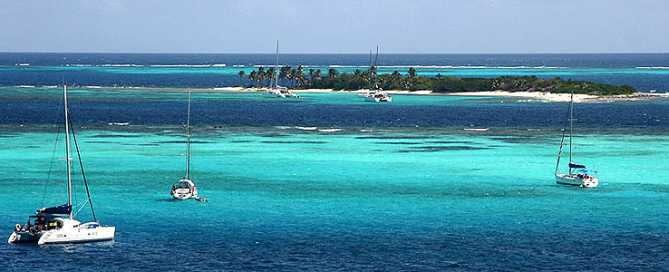






 Lesser Antilles – Km 135,620
Lesser Antilles – Km 135,620
The first thing that came into my mind when I thought of these islands was paradise: crystal clear sea, endless beaches of white sand and also inclined palm trees.I imagined its people, mostly African descendants, friendly and curious, living mainly of fishing and agriculture; and sometimes even unrelated to tourism. I believed being on a bicycle could let me get into the best places, that I could camp and enjoy fabulous sunsets, getting along with people, and make some friends. I thought that visiting these islands would be easy and wonderful.
Before traveling to the islands I stopped in Medellin Colombia, nearly a month during the holiday season. Taking advantage of the tourist traffic of the city on those days, I went almost every day to sell my documentary and thanks to Carlos and Diego I gave a talk of my trip where a lot of people attended. The people of Medellin have treated me the best and before leaving I had the funds for the 9 flights, 6 boat trips that lead me to over 12 countries: Curacao, Trinidad and Tobago, Granada, St. Vincent and the Grenadines, Barbados, St. Lucia, Martinique (France), Dominica, Puerto Rico (USA), Dominican Republic, Haiti and Cuba.
To do this I had to get rid of 25 kilos of luggage (I left in Colombia), because the planes that fly from island to island are small and the passage just include a package free. The bicycle, as a second lump usually pays between 40 and 60 USD, as long as space is available. I was very nervous about flying, not only because of the uncertainty that I had about arriving with my bike to destination, but for the several surprises I got every time I disassemble and assemble it. My third bike is old, it has over 80,000 km.
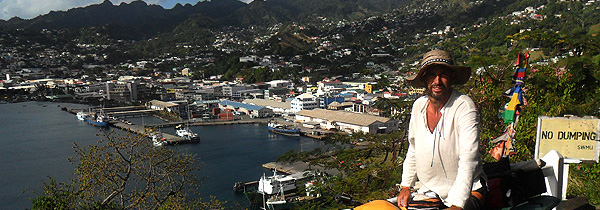
On the islands there is no alternative tourism, no backpackers or hostels, nor campsites, and everything is expensive. Therefore I came in and out of the airport always pedaling, and in each country always had someone to receive me at home for a couple of nights. Then, with a better idea, I pedaled the island, which never exceeded 200 or 300 km. I took several days because most of them have terrifying slopes.
The Caribbean people are curious and most of the time are friendly, but when I asked for a place to camp they totally got transformed. The African descents are not used to see a white man on a bike asking them to pitch the tent in their house garden or near it. They do not understand it because there is no culture of camping. And if once they had camping sites on some island as I was told, violence and theft have made disappear. Anyone who hear my intentions to camp insisted me not to do so, and to be careful . Sometimes I tried to camp on the beach, but when the sun goes down the atmosphere gets heavy because the few people remaining starts drinking. Anyway at least once I camped on most islands. I always talk to African descents because they are the ones that inhabit the islands, but they never allowed me to camp where I asked, but far, far away from them, justifying the violence of the place or something stupid. They not once approached me to ask if I needed at least water. They did not seem hospitable people and casually half mails I sent were directed to African descents, but those who received me were always white, mestizos and Indians.
“They are resentful black people” told me a journalist in Curacao, when once a man totally ignored us when I asked him to take us a picture. And many people agree. It is not very difficult to understand, since all these islands were marked by more than 300 years of slavery and 80% of the population are descendants of slaves. I imagine that even the term “white shit” was passed from father to son, from generation to generation. And I do not think that today is very different because are white descendants of the settlers who not only have a lot of land, but also control a number of economic sectors, particularly agriculture, while much of the black population lives in extreme poverty.
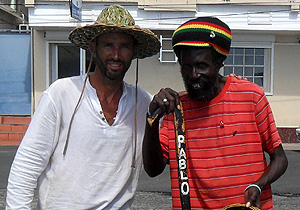
Pablo a Rasta I met in Santa Lucia told me about it: “It’s as if he had white supremacy, whites are hotel and companies managers, captains of ships, owners of supermarkets. The worst problem is that the money is not invested here, not even spend it, they take it out”
In each island I visited, I stopped a couple of days in the capital to exhibit and sell my trip documentary. I did it for 4 or 5 hours and usually had to deal with obnoxious and drunk people.
In Granada I was approached by a guy completely drunk and although is not my type customer I told him barely about my journey I do not like him, I noticed in his look of rage. It bothered him looking me there, captivating the curiosity of people, making money. That’s why he stayed there scaring everyone that stopped and talk to me. Then he began to insult me verbally, walking and eating around my bicycle, spitting near me. He was a 50 year old guy, but big, well-marked muscles. He was looking for a fight.
Suddenly he hit me once on my back, and left. It hurt but I thought it ended there and I did nothing. But after a while he came back and threw me another blow. Bless my luck, because a police officer who was not far saw everything. He came close just at the time we were challenging us and interfere, he spoke in Creole, in a threatening tone and the guy left. Minutes later I did the same and never came back.
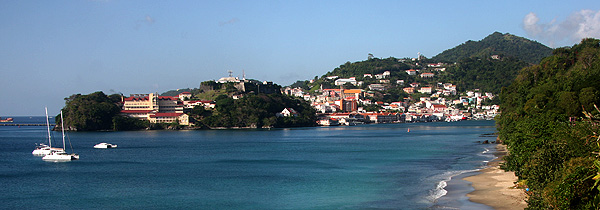
The Indian population of the islands also likes to drink. I went through each of its territories and in the morning you can see them hardly on its feet. Alcoholism is a serious problem in the islands, also gender violence and criminality. Caribbean people live with the paranoia of the theft, is the common history of almost all the people I met. For example, Thierry who received me in Dominica had just been robbing at my arrival, it was the seventh time that happened to him over a period of six years. The Curacao thieves love to be around parking lots and break windows to steal. It is common to see broken glass in the parking lot and they steal with a machete, as happened to a couple who were before me in a secondary route.
Gradually the paradise I thought was falling apart, not only the episodes that I lived but finding the perfect beach. The northern beaches of Curacao, for example, are the most beautiful on the island, it has a turquoise sea like no other, but the sand has so much coral that you cannot walk barefoot. Some of them are private and you must pay to enter 10 USD.
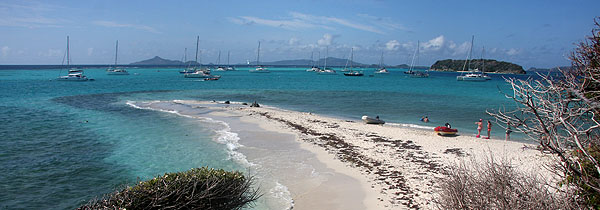
In Granada and SVG (Saint Vincent and the Grenadines) there are hundreds and hundreds of boats of all sizes. It seems to be the perfect place to sail, because there are many small islands that hide perfect paradises, such as the Tobago Cays National Park where I was so lucky to get to the park rangers and saved 100 USD and swam with turtles, but I would have liked to exchange a few words with those guards. We were a day together and did not speak a word, only to be told when I filmed from the boat: “you can not shoot here you need a special permit”, it was a lie obviously, these guys were tired of working with tourists and bothered for a gringo filming them, and even more if this gringo travels free by order of the boss.
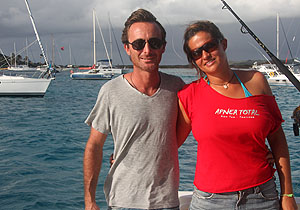
As Luca, an Italian who works in the area four years now said to me, SVG is the poorest country in the Americas after Haiti, and is where more thefts to ships occur , just when people go ashore. The Italian and his Argentinan girlfriend Lucrecia makes charters on their of 3 million USD boat and when I told my story they decided to sponsor me a day on board, that cost about $ 1,000 per person. That day I felt like Don Johnson in Miami vice.
Barbados beaches usually do not have palm trees, but pines. Not much shade to shelter, but at least there are public bathrooms and showers and not all the islands I visited. I found Barbados the most beautiful island, the richest. Is safe, they say there is no crime, nor felt that suspicious look from his people; possibly because most people work directly or indirectly with tourism, the main industry and the purchasing power is much greater than any of its neighboring islands. Unlike the other islands,
Barbados has good public transportation and is flat. If I have to choose an island to come back i will pick Barbados and maybe Martinique, although this one is the most polluted and expensive.
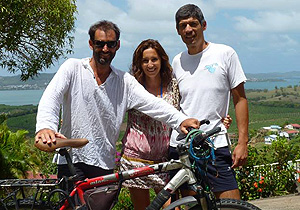
According to Yoham, a French touring cyclist lover who received me in Martinique and currently works as a teacher, holding intensive banana monoculture was deforestation and large-scale pollution cause.
For decades the white people or Bekes landowners, as they are known on the island, sprayed with jets using an extremely toxic and long-lived in the environment pesticides: chlordecone, although it was known that this chemical was cancerous. As a result not only the fields where it was grown bananas are contaminated, but also the slopes of the land, aquifers, rivers, mangroves and sea. Therefore there is a ban on fishing along the coast of Martinique. According to the National Cancer Institute, a few years ago the island had the highest incidence of prostate cancer in the world, and that is linked to chlordecone” Yoham said. I was told, that also the Bekes control the imports and exports. The owners of the supermarkets are 4 or 5 families that between them agree on imposing exorbitant price margins.
The price of food in Martinique is one of the highest in all the islands visited. The kilo of tomatoes for example, never goes below 5 or 6 Euros.Another country I visited was Dominica, a different island because the attractions are not its beaches, but the mountain, trekking, waterfalls and hot springs baths.
Compared to the neighboring islands there is a few tourism, therefore everything is authentic and people smile at you, especially if they see you pushing a bicycle on one of those roads that have 25º tilt. Here I found a good place to camp, with their own baths. Pay what you can said to me June, the rasta owner of the place.
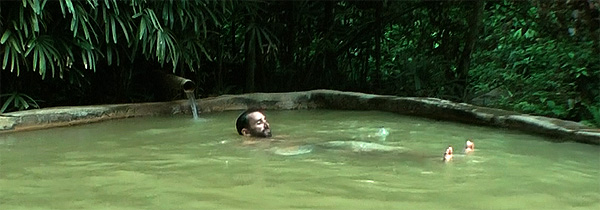
Also St. Lucia island with its terrifying slopes to ride and like neighboring islands, has become the deterioration of the banana industry and the rise of unemployment and underemployment in higher levels of poverty. This island changed hands 14 other times! The last was the British who granted independence in 1979.
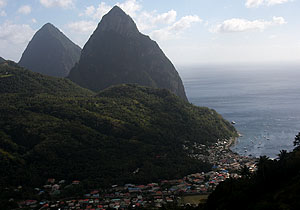
Today the island is invaded by cruises, they reach 4 in one day, but this is not a rich tourism because most arrive in the morning and leave in the afternoon. Few locals benefit from the thousands of tourists who arrive almost daily. There the people are very poor and in every town I visited I found young men anxiously waiting to get a tourist to hire them as guides.
Trinidad is a different island because does not live on tourism. It is an island that has oil, industries and lot of population as much traffic, too much for the infrastructure of the island. I was surprised at the amount of Indian population in here and how despite of the centuries maintain their culture and traditions.
In my tour of the island I visited a couple of temples that pay tribute to Hindu deities and in one of them I witnessed a cremation ceremony. 50% of the population in Trinidad is a descendant of the Indians who came through the British Empire to replace the slaves 200 years ago. The other 50% of population is of African descent, who worked as slaves on the plantations of sugar cane and tobacco. In this country I was received by Anderson Modeste, a descendant lawyer of both ethnic groups, with a very small house, but a very big heart.
I also want to thank the people who received me with great affection at home, at their hotel or helped me with some transfer:
Matthis and Yohanna, Carlos and Jos in Curazao
Anderson, Trinidad and Tobago
Danny Donelan, Kim and Lylette in Granada,
Luca and Lucrecia, MOUN BEU Luxury Yatch Charter
Jade from Union Island, www.grenadines-bougainvilla.com
Rob in Bequia, Cecile in San Vincent, SVG
Capitan Elvis Gooding (Jade Sun)
Fatima and Sarah in Barbados
Liz and Peter in Rodney Bay, Simon Bryan from Igy Marina, St Lucia
Martin and Monica in Soufriere, St Lucia: http://www.stluciacrystals.com/
Uta Verena and Tania from Balenbouche State, St Lucia http://www.balenbouche.com/
Yoham and Eva in Francois, and Manuel, Fede, Nacho and Luis from Mourne Rouge, Martinica
Thierry and June in Dominica.
Ti Kwen Glo Cho Hot Springs, Dominica (tikwenglocho@gmail.com)


